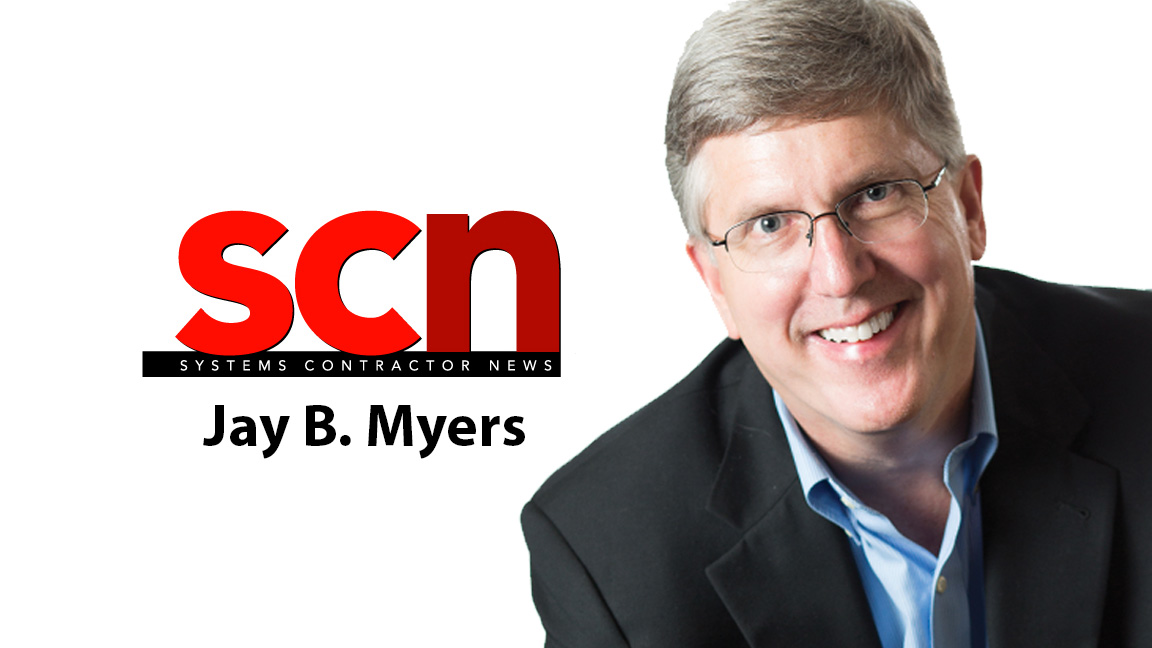Viewpoint: Writing a Book Can Help Grow Your Business and Your Career
Is it worth the time, effort, and expense it would take to get a book published? Well, that depends on whether or not you have something to say.

Let me start by making it clear that I never intended to write a book way back in 2006. For one thing, I majored in marketing in college, not journalism, and never really felt qualified to even think about writing a book—much less actually do it. So why do I suggest that AV professionals should even consider taking on such a formidable task? Is it worth the time, effort, and expense it would take to get a book published? Why did I personally decide to write a book?
For me it got down to one simple answer: I had something to say, and a book seemed like a great way to get that done. And that’s the first lesson I learned about getting a book published.
Something Different to Say
In my first book, Keep Swinging, I had something to say about overcoming adversity in business and life and never giving up. In my second book, Hitting the Curveballs, I had something to say about how to motivate millennials, as well as how crisis can strengthen and grow your business. In my latest book, Rounding Third and Heading for Home, I had something to say about how selling a business is way more than a financial transaction but more of a life-changing event.
[Tried-and-True Wins the AV Heart and Business]
With each book, I not only had something to say but I committed to saying it in a different way. I decided if I was going take the time to write a book, it had to be different from the rest—not your regular old business book. So, I made a commitment to intentionally write my books in the first person. I wanted my readers to feel the emotions that I was feeling at the time I was dealing with all the challenges and obstacles through the years.
With so many choices out there, make sure your book has a differentiator, so it stands out from the rest.
By telling my story in such a personal manner, my hope was to connect with readers on a totally different level. And it worked! As one reader noted in a recent review of my latest book, it “doesn’t read like a typical business book—very refreshing! You won’t read the same old advice or be lectured with the top ten set of rules found in just about every business or leadership book.”
So I learned yet another valuable lesson. With so many choices out there, make sure your book has a differentiator, so it stands out from the rest.
A daily selection of features, industry news, and analysis for AV/IT professionals. Sign up below.
[Myers: Customer Service Can Make or Break Your Business]
Another lesson that I learned is that, as an author, you must know your audience. With all three of my books, I have focused on small business owners and entrepreneurs who I believe appreciate “real world” advice from someone that has been there and done that. I also believe that if my books can offer one piece of advice that helps one small business owner or entrepreneur succeed, then writing them was all worth it.
Calculate the True Value
On a personal note, I have to say I have lost count how many emails I have received through the years from so many people who have read my books and let me know how inspired they were by our stories of meeting business challenges and overcoming adversity. How can you really put a dollar value on that?
However, outside of our own experiences with writing books, is there a practical side to writing a book for other AV professionals to consider? Is there a way to really monetize it?
[Editorial: The Big Quit Will Be…Televised on TikTok?]
First, being a published author establishes instant credibility and positions you as a “subject matter expert” with clients and prospects. In essence, it positions the author as not just a salesperson but more of a thought leader, which is a powerful competitive differentiator.
Books also deepen the relationship you have, not only with prospects but with existing clients, vendors, and strategic partners. It enhances the relationship and takes it to a whole new level that is very powerful. It builds trust through transparency.
Finally, think of your book as a bigger, better business card. Meeting someone at a networking event and later sending them a signed copy of your book says so much more than you had time to say when you meet at an event. It also reminds people of who you are, where you met, and personalizes the meeting by taking the time to send them your book. It’s the ultimate attention getter.
Key Takeaways
• Write a book because you have something to say—but make sure you know your audience. Writing a book takes a lot of effort, and you want to make sure there are people out there who want to read it once you’ve written it.
• Put together an outline for your book, because any credible publisher will want to see it before they will even consider taking on your book. An outline is also useful in keeping on track and focused as you work toward completion.
• Set realistic goals. Everyone wants to be on the New York Times Best Seller list, but very few make it. On average ,first-time authors sell around 250 copies of their book, so work on using your book as a marketing tool by giving away copies to customers and prospects at trade shows, conventions, etc.
• Invest in an editor who can not only identify typos but can also help with organization, provide feedback, etc. Using an editor also demonstrates to your publisher that you’re serious about putting out a quality product.
• Consider self-publishing options. The traditional New York publishing world is very difficult to get into, but there are many other options to get your book published. Self-publishing and Amazon are easy and affordable options.
Jay B. Myers is the founder and CEO of Interactive Solutions, which was sold to AVI-SPL in the fall of 2018. He is the author of Keep Swinging: An Entrepreneur’s Story of Overcoming Adversity and Achieving Small Business Success and Hitting the Curveballs: How Crisis Can Strengthen and Grow Your Business.

